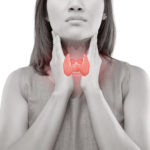The thyroid gland is found in the neck and produces hormones that control many of the body’s functions including heart rate and metabolism. Hyperthyroidism is the condition where the thyroid gland over produces these hormones causing the body to function improperly. Grave’s Disease is one of the conditions that is characterized by an excess production of thyroid hormones. It is caused by an autoimmune disease, which means that the body is producing antibodies that attack the cells in the thyroid gland and cause it to malfunction. It more commonly affects women, and usually starts before the age of 40. Some of the factors that can cause Graves’ disease are genetics, a family history of the disease, having other autoimmune diseases, stress, and smoking.
The diagnosis of Graves’s disease is made by physical examination and also lab tests that measure the production of thyroid hormones in the blood.
Symptoms of Graves’ disease include:
• Anxiety
• Weight loss
• Irritability
• Increased perspiration
• Slight tremor
• Difficulty sleeping
• Bulging eyes
• Frequent bowel movements
• Rapid or irregular heart beat
Treatment for Graves’ disease is very important. Depending on the severity, it may be necessary to destroy the thyroid gland using radioactive iodine or completely removing it by surgery. If the thyroid gland is no longer functional or present, supplemental hormones will have to be taken daily that mimic its function in order to keep the body regulated properly. If treated properly, the disease can be managed successfully.
If you would like to schedule an appointment with a physician at Flushing Hospital, please call 718-670-5486.
All content of this newsletter is intended for general information purposes only and is not intended or implied to be a substitute for professional medical advice, diagnosis or treatment. Please consult a medical professional before adopting any of the suggestions on this page. You must never disregard professional medical advice or delay seeking medical treatment based upon any content of this newsletter. PROMPTLY CONSULT YOUR PHYSICIAN OR CALL 911 IF YOU BELIEVE YOU HAVE A MEDICAL EMERGENCY.

